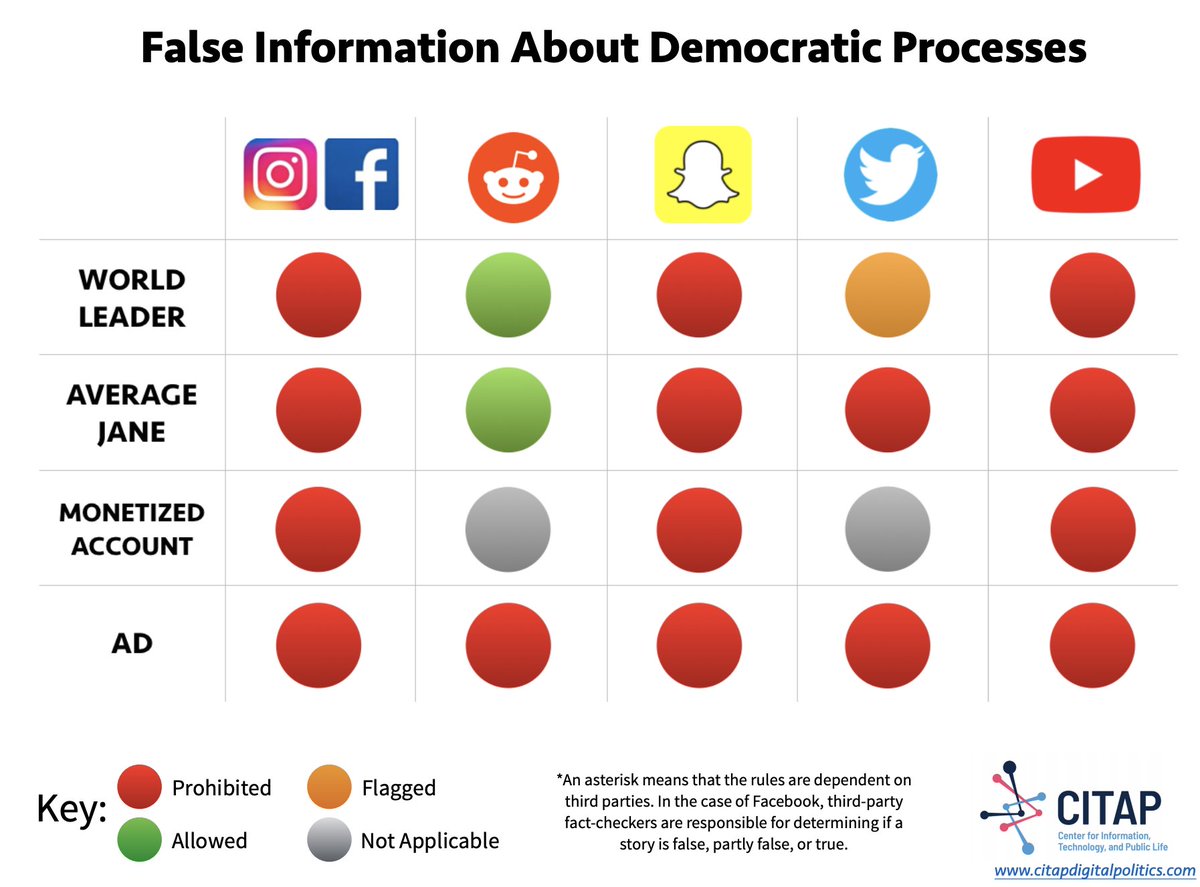
So, given that @nick_clegg's post got a ton of attention, some thoughts. I spent the last three months reading everything I could find on 'polarization' and related literatures on things like 'democratic backsliding' for a book on platforms with @shannimcg. Thread. 1/?
https://twitter.com/daphnehk/status/1377665960622977027
First, there are many varieties of and debates about polarization. I am not going to wade into them all here - but I think what is relevant in the platform debate are two key dimensions: why should we be concerned with polarization, and what causes it?
To start with the normative. The literature on polarization has an overriding concern with solidarity. This is ultimately about social and political 'stability.' This is not always expressly stated, but it is the backdrop of everything.
At the same time, the literature on polarization often has *very* little to say about the terms of that stability (i.e.: the structures that underlie that stability and what social groups have power.)
The concern with solidarity and stability is defensible! (Although, scholars should state that it is their overriding concern much more clearly.) There are weak and strong defenses.
The weak one, to my eyes, is that polarization means the loss of political compromise and ability to solve pressing political problems. (I think it is weak because it evacuates the very real competing interests and values that underlie what people and social groups argue about.)
The strong one is that political instability caused by polarization will hurt those most vulnerable in society. For example, white backlash. Ultimately, this concern is about polarization leading to extremist, anti-democratic action, including political violence.
This is a legitimate concern - but one issue in the polarization literature is that it often expressly says little about one-sided extremism. Nor does it say what to do if that extremism comes in defense of fundamental inequalities.
Indeed, critics of viewing everything through the normative lens of polarization (of which I am one) argue that political stability in itself can only be valued if it is premised on democracy and equality.
To my eyes, too much of the polarization literature desires political stability while ignoring that the terms of stability in the US means white supremacy - look no further than massive disparities in health, wealth, voting access, and policing along racial lines.
So, I and others would argue that our foremost concern should not be political stability, but justice and equality. And indeed, political inequality has been far more democratically destabilizing than polarization in the US.
As @BridgetOBarrett and I argued: "Any consideration of the harmful democratic effects of polarization has to address the fact that political inequality....has historically had much greater and more lasting destabilizing and antidemocratic effects, especially for nonwhite groups"
These two normative positions are fundamentally in tension and cannot be easily resolved. Movements for justice both provoke backlash (because they threaten dominant centers) and rely on us/them narratives for mobilization - just as elites do.
I think the dominant normative position in political science, disinformation and platform studies, and policymaking is a concern with polarization because it is apolitical. Polarization is something easily decried and evokes an ideal public. That is where the empirical comes in.
So much of the narrative about Facebook and polarization is about preserving an ideal public. The story goes that people are fundamentally good, but information environments turn them bad. (This is central to the Russian disinformation narrative from 2016 too.)
@nick_clegg and @p_barbera are 100% right though in their summaries of the research literature. The evidence for @Facebook causing polarization is at best mixed. Does that mean it does not occur? No. Should we get better access to data to study it? Yes.
Should polarization be @Facebook's overriding concern? No. See the normative arguments above. I'd much rather @Facebook take a clear stance on the side of democracy and equality and implement the changes called for in the Civil Rights Audit.
And indeed, those other causes matter for what @Facebook can be said to be responsible for. Scholars have rooted polarization in history, psychology, partisanship, racial/ethic/social groups, campaigns, and political institutions (e.g: @LilyMasonPhD @NathanKalmoe).
@chris_bail smartly shows how psychology intersects with the design and affordances of platforms. My work with @shannimcg @LawrenceRegina around 'identity appeals' shows how elites do much of the communicative work of creating in/out groups for political gain, etc.
The sum is that creating, reinforcing, making salient, and mobilizing social and political identities is inherent to politics. Current debates about polarization are concerned with 'sorting' - the idea that major social cleavages in the US now map onto the two parties.
The flip side to that though is that as work like @sjjphd @foucaultwelles @moyazb's show, powerful movements for racial, ethnic, and gender justice now have new communicative power and visibility, and I would add an institutional vehicle in the Democratic Party to pursue redress.
I'll end by stating that this debate over solidarity/justice is not new. This field in its present form is generally just awakening to it post-2016. For example, @creoleprof wrote a brilliant book in 2009 on "Race and the Politics of Solidarity" global.oup.com/academic/produ…
@creoleprof captures exactly this tension between solidarity and justice, and how it is fundamentally racialized in the US:
'For nonnwhites the lack of commitment…to remedy injustices and inequalities belies claims of shared citizenship...whites tend not to recognize such inequalities as problems of justice and therefore to perceive the demands of nonwhites...as the main threats to solidarity.'
• • •
Missing some Tweet in this thread? You can try to
force a refresh



